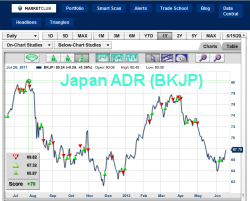Japanese Economy
Japan has been the number 2 economy in the world for 40 years but in 2010 it fell to 3rd place as the economy of China has continued to grow while Japan has stagnated for the last decade. Japan has an aging population and a mature economy while China is growing rapidly. In today’s article, Michael Lombardi of ProfitConfidential looks at the potential of the Japanese Economy to rebound after their recent nuclear disaster.
The Future of the Japanese Economy

The massive Tsunami in March of 2011 created more problems for an already troubled Japanese economy. Not only did Japan have 15,854 deaths and 26,992 injured due to the Tsunami but they also lost invaluable infrastructure and buildings. Massive radiation from damaged nuclear plants takes the scenario from bad to worse.
All these factors have affected the Japanese economy and its gross domestic product (GDP). In the fourth quarter of 2011, Japan’s GDP grew at a muted 0.6%, which is well below its historical average annual GDP growth rate of 2.15% from 1981 to 2011. Goldman Sachs estimates that Japan’s GDP will expand by 1.9% in 2012. The Organization for Economic Co-operation and Development (OECD) pegs Japan’s GDP growth at 2.0% in 2012, but has it declining to 1.6% in 2013.
 [Editor’s Note: This combination of economic factors and natural disasters has resulted in Japan racking up tremendous amounts of sovereign debt (a ballooning government debt is often associated with sovereign debt crises) and Japan has just suffered a credit rating downgrade to “A Plus” which is the 5th highest level.
[Editor’s Note: This combination of economic factors and natural disasters has resulted in Japan racking up tremendous amounts of sovereign debt (a ballooning government debt is often associated with sovereign debt crises) and Japan has just suffered a credit rating downgrade to “A Plus” which is the 5th highest level.
See: Cashing In On Japan’s Debt Conundrum?]
But just today the Japanese Prime Minister Yoshihiko Noda ordered the restart of two idle nuclear reactors. This is the first time the reactors have been restarted since the Fukushima accident. But the restarting of the reactors may be marking the bottom for the Japanese economy.]
The emergence the BRIC countries of Brazil, Russia, India and China is not helping Japan’s case. These countries have emerged as a lower cost option for worldwide investors due to their vast human resources and evolving market.
It’s not a coincidence that Japan’s decline and China’s rise have occurred simultaneously over the last three decades. Massively cheap labor has created a colossal manufacturing capacity enabling the world’s manufacturers looking for cheap labor and a lower cost to produce goods are the secrets of the Chinese rise in the global market.
In overall GDP, Japan is lagging behind China. In 2010, China surpassed Japan as world’s second biggest economy. Though the Chinese economy is going through a temporary bad patch and slow down, they are still miles ahead of other G-7 nations. The great Chinese wall is here to stay. It won’t collapse anytime soon which will continue to put pressure on the Japanese. But…
Don’t Write Off The Japanese Economy Yet
But you shouldn’t write off the Japanese phoenix. Legendary value investor Warren Buffet, one of the most trusted names in the world of investment has some encouraging words about the Japanese economy. He said that there is huge buying opportunity in weakening Japanese stocks. He is right on as usual. There are buying opportunities in Japan.
But still investment in Japan requires careful analysis. Several of the key Japanese banks, such as Mitsubishi UFJ Financial Group, Inc. (NYSE/MTU) and Sumitomo Mitsui Financial Group, Inc. (NYSE/SMFG), are interesting bank plays.
There is a good chance that Japan will remain among world’s best economies but they will continue to face stiff competition from other emerging world players like Brazil, Russia, China and Japan.
So Long, US Dollar As World’s Reserve Currency
Global Debt Market: Biggest Bubble of All Time?
NY Times article on Japanese Economy
